- Logos Bible Study App
- Ways to Use Logos
- Group Solutions
- Shop by Language
- Download & Use
- 2025 Libraries (Best Value)
- Vocational Libraries
- Denominational Libraries (NEW)
- Books & Courses
- Online Courses
- Logos for Students & Faculty
- Digital Gift Cards
- Deals
- Support & Training
- Contact Us
- Frequently-Asked Questions
- Community & Content
Christianity in the British Isles Collection (6 vols.)
Digital Logos Edition
Overview
The Christianity in the British Isles Collection offers a comprehensive look at Christianity’s relationship with Wales, Scotland, Ireland, and England. The six volumes cover a variety of fascinating topics, including the history of Anglicanism, the little-known Free Church of England, the parallel Reformation experiences of the British Isles, and the outlook for the Church of England in a modern United Kingdom of many faiths. Written by experts in their respective fields, the collection examines Christianity in the British Isles with both a historical and critical eye. Looking into these nations’ history with Christianity illuminates its current situation, and gives insight to the possibilities for the future.
Of special note among the Christianity in the British Isles Collection are two titles concerning the scholarship of the late Alexander Campbell Cheyne, widely regarded as one of the foremost Scottish scholars of Church History. Studies in Scottish Church History explores the history of religion in Scotland since the Reformation, paying much attention to the Church leaders who have helped shape Scottish Christianity. Scottish Christianity in the Modern World continues the erudite explication of Scottish Christianity with essays from renowned scholars penned in Cheyne’s honor.
- Comprehensive look at Christianity's relationship with Wales, Scotland, Ireland, and England
- Describes nations' history and current situations
- Title: Christianity in the British Isles Collection (6 vols.)
- Volumes: 6
- Pages: 1,815
This title is included in the following collections
You can save when you purchase this product as part of a collection.
Logos 6 Anglican Diamond Legac...
$2,999.99$2,999.99Logos 5 Anglican Diamond Legac...
$2,999.99$2,999.99Logos 6 Anglican Portfolio Leg...
$4,749.99$4,749.99Logos 9 Ultimate Legacy Librar...
$24,999.99$24,999.99
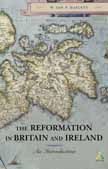
This volume is a new and wide-ranging introduction to the Reformation throughout the British Isles. Full treatment is given to the fascinating and often very different but interrelated experiences in England, Wales, Scotland and Ireland.
The approach is unique. Previous introductions have invariably concentrated on England, with lesser sections on Wales and Scotland, often ignoring Ireland altogether. The volume is more than a modern introduction, survey and summary of the Reformation period. Ian Hazlett provides fresh research and critical analysis, which will be of considerable interest to a new generation of scholars and students. The material is written and organized in a highly readable and accessible form. Here is a well-balanced introduction and resource for non-specialists as well as scholars and students.
Really refreshing to see the Reformation in the British Isles viewed in a proper European theological perspective... One of those books which really needed to be written.
—Alan Ford, Universty of Nottingham
Dr. Ian Hazlett is Professor Ecclesastical History, University of Glasgow.
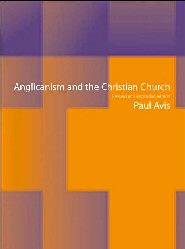
This is a work of considerable strategic importance for the ecumenical movement and for the Anglican Communion. It describes and interprets Anglican understanding of the Christian Church, from the Reformation to the present day. This volume presents the development of Anglican identity and ecclesiology in its historical context, focusing particularly on Anglican engagement with the Roman Catholic and Protestant traditions. The volume also provides substantial accounts of the major Anglican theologians, from Richard Hooker to modern writers. The author also includes discussions of the influence of evangelical theology and reflects on the integrity of Anglicanism for the future.
Dr. Paul Avis is General Secretary of the Church of England's Council for Christian Unity, Sub-Dean of Exeter Cathedral, and Director of the Centre for the Study of the Christian Church.
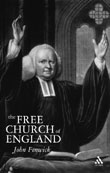
Most Christians are completely unaware that for over 200 years there has existed in England, and at times in Wales, Scotland, Canada, Bermuda, Australia, New Zealand, Russia and the USA, an episcopal Church, similar in many respects to the Church of England, worshipping with a Prayer Book virtually identical to the 1662 Book of Common Prayer, and served by bishops, presbyters and deacons whose orders derive directly from Canterbury, and ecumenically enriched by Old Catholic, Swedish, Moravian and other successions. The Free Church of England as an independent jurisdiction within the Universal Church began in the reign of George III. In 1991 the Church sent a bishop to George Carey's Enthronement as Archbishop of Canterbury.
In addition to presenting for the first time a detailed history of the Free Church of England, John Fenwick also explores the distinctive doctrinal emphases of the denomination, its Constitution, its liturgical tradition, its experience of the historic episcopate, and its many connections with other churches (including the Reformed Episcopal Church in the USA). He discusses why the Church has, so far, failed to fulfill the vision of its founders, and what the possible future of the Church might be - including a very significant expansion as many Anglicans and other Christians considering new options discover this historic, episcopal, disestablished Church with its international connections and ecumenical character.
Anyone who is interested in the history of Anglicanism or the continuing influence of the Evangelical Revival on church life in this country will benefit from a careful study of the readable and helpful book.
—Ian P. M. Cundy, the Bishop of Peterborough
Rev. Dr. John Fenwick lectured in Christian Worship and Church History at Trinity College, Bristol. From 1988-92 he was Assistant Secretary for Ecumenical Affairs to the Archbishop of Canterbury.
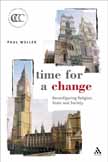
In Time for a Change, Paul Weller argues that continuation of the establishment of the Church of England is theologically and politically inadequate to the religious, social and political landscape of the twenty-first century. Theologically and ecclesiologically, he suggests that reluctance to actively consider alternatives is symptomatic of a lack of confidence that needs to be overcome. Socially and politically, for a society that aspires to be inclusive of people of many religions and none, the continuation of establishment is argued to be inequitable.
Within an outline of the contemporary religious landscape and the empirical results of research into the nature and extent of religious discrimination, Time for a Change traces the historical and contemporary contours and implications of establishment. A range of alternative social, legal historical, theological and ecclesiological approaches and models are examined and aspects of “negotiation theory” are used to explore the conditions and dynamics necessary for transition and change.
Finally, Weller argues that often-neglected perspectives of Baptist Christian tradition - in particular its theologically founded commitment to religious freedom and voluntaryist ecclesiology - offer more adequate resources for shaping the Christian future in a religiously plural and secular society than perspectives historically associated with establishment. Time for a Changeshows that, through the conjunction of social, political, demographic, theological and ecclesiological developments, a “kairos,” or decision time has arrived for establishment. It aims to stimulate a social and religious dialogue leading to the evolution of a new “socio-religious contract.”
This timely book by a “public intellectual” brings questions about disestablishment to life… it speaks directly to the interests of scholars, religious professionals and lay people alike.
—Jim Beckford, Professor of Sociology, University of Warwick
Paul Weller is Professor of Inter-Religious Relations at the University of Derby. He is editor of Religions in the UK: Directory 2001-3 and was Project Director of the Home Office commissioned project (1999-2001) on Religious Discrimination in England and Wales.
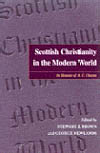
A new and wide-ranging study of Christianity in Scotland, from the eighteenth century to the present. The contributors include D. W. D. Shaw, Ian Campbell, Kenneth Fielding, William Ferguson, Barbara MacHaffie, Peter Matheson, John McCaffrey, Owen Chadwick, David Thompson, Keith Robbins, Andrew Ross, Stewart J. Brown and George Newlands.
Topics encompass varieties of unbelief, challenges to the Westminster confession, John Baillie, Queen Victoria and the Church of Scotland, the Scottish ecumenical movement, the disestablishment movement, and Presbyterian-Catholic relations.
Stewart J. Brown in Professor of Ecclesiastical History and Dean of the Faculty of Divinity, University of Edinburgh.
George Newlands is Professor of Theology, University of Glasgow.
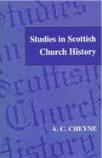
In these studies, Alec Cheyne explores the history of the churches of Scotland since the Reformation. Professor Cheyne looks especially at the leaders: among them Robert Rollock, Robert Leighton, William Carstares, Thomas Chalmers, John Tulloch, John Caird, Henry Drummond, John Baillie and Donald Baillie. He illuminates just how much change and diversity in thought, worship, government and culture these four hundred years have witnessed in the churches - far greater than has traditionally been supposed.
Professor Cheyne also describes the importance of the constant interaction between ecclesiastical and academic affairs, and the very wide influence of the churches on Scottish life as a whole.
Studies in Scottish Church History is a significant work of Scottish history and reference.
Alex Cheung was Professor of Biblical Interpretation, Christian Witness Theological Seminary, Concord, California.